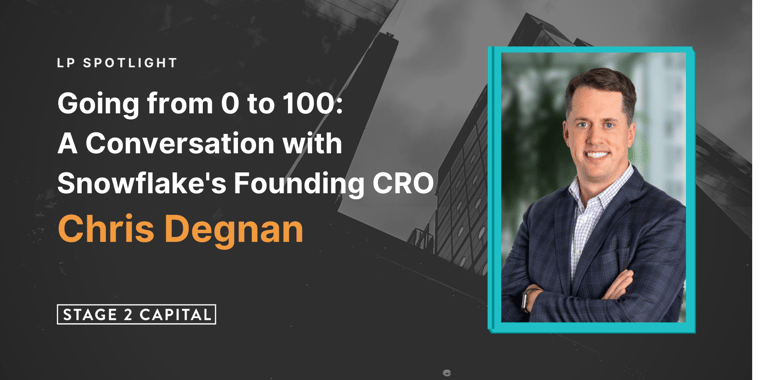Stage 2 Capital LP Chris Degnan has been incredibly successful in his career.
Chris has over 20 years of technology sales experience, joining Snowflake as an early employee in 2013. He sat down with Stage 2 Capital Co-Founder & MD Mark Roberge to discuss Chris’ tenure as Snowflake’s founding CRO, along with what it took to generate hundreds of millions in ARR for the now public company.
Early Days at Snowflake: Uncovering Product-Market Fit & ICP
Chris joined Snowflake as the company’s first salesperson, while the other 15 employees were focused on engineering and building the product.
Even though Chris was brought in to generate revenue, he first had to bridge the gap between sales and engineering, so he partnered closely with his founders to find product-market fit. Chris set a goal of having 8 customer meetings per week, and surfaced relevant insights to help uncover Snowflake’s Ideal Customer Profile (ICP). The engineering team then used this information to make product decisions.
Additionally, Chris set out to identify early adopters through email campaigns. He hired an intern, manually built lists, and blasted 2,000 emails per week asking, “Can I get your feedback on what we’re building?”
Moving from Feedback to Purchase
After collecting useful input on what Snowflake had to offer, Chris began the transition of acquiring feedback to now acquiring customers. He listened to the pain points of prospects, and honed in on relevant use cases.
Chris never directly asked people to buy. Instead he said, “Try it out. If you like and use it, pay for it.”
Eventually, Chris partnered with Marketing to launch self-service, getting even more new customers to sign up. To this day, Chris has ensured their first 10 customers still have Founders pricing, and will continue to offer the best pricing he possibly can.
The Right Time to Move into Enterprise
Even with an account-based marketing (ABM) play, Chris says, “You’re fooling yourself if you’re going to build an Enterprise focus early on. That’s a waste of time.”
Instead, he suggests that revenue leaders focus on achieving high-velocity sales with a low Average Selling Price (ASP), and creating a repository of reference-able customers. They should wait until they’re pulled upstream, and their team is generating material revenue.
What to Look for with the First Sales Leader
The grind is real for any sales leader at an early-stage startup. Therefore, Chris suggests finding someone who is not far-removed from selling, but has had sales leadership experience. They need to know how to determine product-market fit, and ideally, have sold in your space and know how to bring in net-new logos.
Get front row access to conversations like this by applying for the 2023 Stage 2 Capital Accelerator — more info here.

